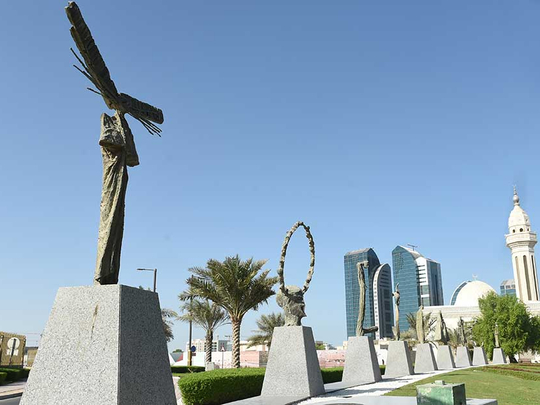
Abu Dhabi: Tolerance, acceptance, coexistence and understanding are deeply entrenched values in the UAE — an incubator of more than 200 cultures and nationalities, a top official said on Thursday.
“The values of tolerance, respect of differences between people and convergence of many religions in a modern country were not born out of the appointment of a Minister of Tolerance earlier this year; they are authentic qualities of Emirati society and an integral part of our culture,” said Shaikha Lubna Al Qasimi, Minister of State for Tolerance.
His Highness Shaikh Mohammad Bin Zayed Al Nahyan, Crown Prince of Abu Dhabi and Deputy Supreme Commander of the UAE Armed Forces, has presented to the world a magnificent sculpture to promote peace and tolerance, Shaikh Lubna said while addressing a press conference in Dubai.
The bronze structures are an ode to tolerance encapsulated in nine bronze letters portraying priests, wise men and pilgrims. They are positioned outside the Abu Dhabi Crown Prince’s Court. Ahmed Kutty/Gulf News
The bronze structure, created by renowned international artist Guy Ferrer in 2008, is an ode to tolerance encapsulated in nine bronze letters, portraying priests, wise men and pilgrims and is positioned outside the Crown Prince’s Court.
Each bronze sculpture evokes a different aspect of spirituality, with Ferrer superimposing them symbolically, giving them the freedom to conduct dialogue in a profound way.
The word tolerance becomes intelligible because of each letter, each being indispensable and of equal importance to fully signify the meaning of the word. In this way, the various cultures and spiritual beliefs of different societies can coexist and complement each other in the shared hope of reciprocal respect.
The nine monumental letters are emissaries inviting people to meet them, to respect their differences and their beliefs. Together, they speak to different people of harmony, of peaceful co-existence and fraternity.
Shaikha Lubna said the national tolerance programme was based on Islam, the UAE constitution, Shaikh Zayed’s legacy and the country’s ethics, international conventions, archaeology and history, humanity and common values.
The UAE’s leaders always remain at the forefront of efforts aimed at achieving interaction among all religions and promoting values of cooperation, love and peace across the Arab World and the world at large, she said.
“Tolerance is a key value of our ancestors and our founding fathers,” said His Highness Shaikh Mohammad Bin Rashid Al Maktoum, Vice-President and Prime Minister of the UAE and Ruler of Dubai, as he launched the National Tolerance Programme in June.
The UAE has succeeded in spreading the principles of tolerance, moderation, and respect for others practised by the founding father of the country, Shaikh Zayed Bin Sultan Al Nahyan, throughout the Arab region and the world.
The most obvious example of religious tolerance in the UAE is the fact that it is home to over 200 nationalities and 40 churches, a Sikh temple, and two Hindu temples — substantially more centres of worship of other faiths than all other GCC countries combined.
The national tolerance programme involves collaborating with federal and local entities under five main themes.
These are strengthening the government’s role as an “incubator” of tolerance, consolidating the family’s role in nation-building, promoting tolerance among youth and steering them away from extremism, enriching scientific and cultural content, and integrating international efforts to promote tolerance.
The programme set up a Council of Tolerance, which will develop policies to promote tolerance locally, regionally and internationally.
Organisations would be encouraged to support tolerance through a Tolerance Responsibility Programme for Organisations, which the Cabinet described as one of the first of its kind worldwide.
A UAE Charter of Tolerance, Coexistence and Peace will also be set up, promoting respect for cultural diversity and rejecting violence, extremism and racism.
The programme also established a UAE Tolerance Centre, which will provide scientific and cultural content on tolerance and practices related to people’s daily lives.
The UAE’s tolerance strategy also includes the Hedayah Institute, which is in the front-line of combating extreme religious violence; the government’s commitment to interfaith dialogue; and investment in key academic institutions and scholars committed to promoting an Islam that is moderate and responsible.
While appointing Shaikha Lubna as the Minister of State for Tolerance, Shaikh Mohammad said the new position would have a person who “will instill tolerance as a fundamental value of society”.
Earlier, the UAE also passed an anti-discriminatory law, which forbids citizens and residents alike from discriminating against anyone on the grounds of caste, creed, culture or religion.
The sculpture signifying tolerance was also installed in France, Germany and Poland.








